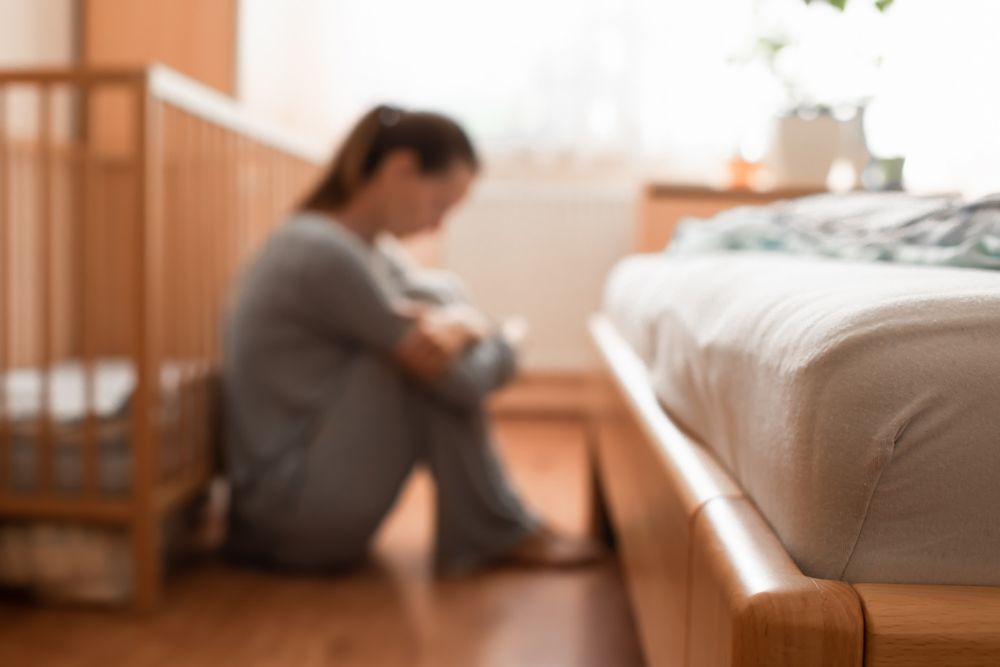It is estimated that up to 20% of new mothers experience postpartum depression—a more severe form of the “baby blues” that are experienced by most mothers in the first two weeks after a child’s birth. Women who are struggling with postpartum depression face an increased risk of developing a substance use disorder, but help is available.
About Postpartum Depression
Postpartum depression is triggered by the sudden change in hormone levels that a woman goes through after giving birth. After labor and delivery, estrogen and progesterone levels plummet.
When combined with the lack of sleep that is common with a newborn at home, this can cause a wide range of mental health challenges.
Any new mother can suffer from postpartum depression, but some of the risk factors that contribute to the condition include:
- Being under age 25
- Having an unplanned pregnancy
- A past history of depression or mental illness
- Previous postpartum depression
- Lack of a strong support system at home (being a single mother, having a spouse who is working long hours, living far away from extended family, etc.)
- Job loss or financial stress
- Complications during childbirth
Some of the common symptoms of postpartum depression include:
- Crying for no apparent reason
- Eating too much or too little
- Unexplained physical problems like frequent headaches, muscle pain, and digestive problems
- Difficulty concentrating
- Lack of interest in previously enjoyed hobbies or special interests
- Feeling irritable or anxious
- Feeling hopeless or overwhelmed
- Withdrawing from friends and family
- Worrying about bonding with your baby
- Doubting your ability to care for your baby
- Thinking about harming yourself or your baby
Many cases of postpartum depression resolve within three to six months after a child’s birth. However, it’s possible for new mothers to be struggling with postpartum depression for one year or more—especially if they don’t seek treatment or if they continue to lack a strong support system at home.
Although postpartum depression statistics only account for live births, mothers who miscarry or suffer a stillbirth can experience similar symptoms. The trauma of pregnancy loss can also lead to a post-traumatic stress disorder (PTSD) diagnosis.
How Postpartum Depression Increases Addiction Risk
Any mental health struggle increases a person’s risk of developing a substance use disorder. This includes postpartum depression.
Women are often raised to believe that childbirth and motherhood should be effortless. This makes them less likely to reach out when they’re feeling overwhelmed by the responsibility of caring for a newborn. Instead, they may turn to substance abuse to self-medicate their symptoms.
Alcohol is by far the most commonly abused substance among women suffering from postpartum depression. “Wine mom” culture contributes to this since it frames drinking alcohol as a form of self-care and trivializes the struggles of motherhood by labeling a bottle of wine as “Mommy juice.”
Although women who regularly drank before becoming pregnant are most likely to see alcohol as a temporary solution to their mental health struggles, it’s still possible for those who seldom or never drank before giving birth to start drinking to excess. As an alcohol tolerance develops, a person who is drinking to self-medicate will need to continue to increase their consumption. This can lead to a wide range of problems, including withdrawal symptoms when they are unable to consume alcohol and alcohol-related memory loss. A postpartum woman who is sleep-deprived and struggling to get into a workable routine with her newborn can easily miss the signs that her drinking is becoming a serious problem.
Some signs that a woman may need to be evaluated for an alcohol use disorder include:
- Frequently drinking more often than intended
- Feeling powerless to regulate alcohol consumption
- Believing alcohol consumption is necessary to feel normal
- Struggling to control thoughts of obtaining or using alcohol
- Ignoring parental responsibilities or other obligations to spend more time drinking
- Becoming angry or defensive when others express concern about alcohol use
Getting Help
Women with postpartum depression and a co-occurring substance use disorder need access to a full continuum of care designed to fit their unique needs. These issues won’t get better without treatment, and focusing on abstinence from addictive substances without addressing the challenges a new mother faces only sets the stage for a relapse.
At St. Joseph Institute for Addiction, we provide holistic care to heal the mind, body, and spirit while encouraging the development of the wellness-focused lifestyle habits that are crucial for a lasting recovery. Located on a beautiful mountainside in central Pennsylvania near State College and Altoona, our residential addiction treatment center is in-network with many insurance companies. Our admissions representatives can verify your coverage with no cost or obligation and answer any questions you might have about our treatment program. Contact us today to take the first steps towards a brighter future for you and your family.


